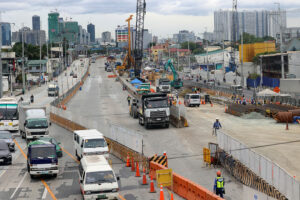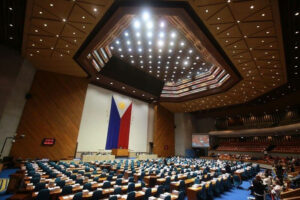By Aubrey Rose A. Inosante, Reporter
RIGHT-OF-WAY (RoW) bottlenecks are stalling the rollout of official development assistance (ODA)-funded infrastructure projects, Asian Development Bank (ADB) Philippine Country Director Andrew Jeffries said.
“The problems that are ongoing — right of way, land acquisition and the like, are problems faced globally, that’s not a unique problem in the Philippines,” Mr. Jeffries told BusinessWorld on the sidelines of an event on Oct. 6.
He cited densely populated areas such as the Clark region through Metro Manila to Laguna, where the ADB-funded Malolos-Clark Railway, part of the North-South Commuter Railway (NSCR), is located.
“The government in particular is very adamant that progress be made quickly, and they’re anxious to show tangible results during this administration. We’re working hard with them to make sure that happens,” Mr. Jeffries said.
The acquisition of RoW from landowners for National Government infrastructure projects is mostly hampered by disputes over property valuation.
Department of Transporation (DoTr) Acting Secretary Giovanni Z. Lopez said the newly signed Accelerated and Reformed Right-of-Way Act (ARROW) as a key tool in resolving land acquisition issues.
The agency also expanded its workforce, tightened coordination with the local government units for RoW acquisition.
“On the issue of right of way, I think we have to disabuse our mind that to consider right of way as parallel activity, it must be considered as the first priority when it comes to project implementation,” he said in a separate Philippine Development Forum panel on Oct. 6.
Republic Act No. 12289 or the ARROW law, which was recently signed by President Ferdinand R. Marcos, Jr., sought to streamline the land acquisition process to ensure the faster construction of key infrastructure.
This measure amended the existing law on government access or expropriation of land for infrastructure projects by clarifying provisions on subterranean or underground rights-of-way.
It covers roads, bridges, power and water pipelines, telecommunications facilities, airports, seaports, and irrigation projects, among others.
Mr. Lopez said it already resolved 75% of right-of-way issues for the Metro Manila Subway and expected to complete 95% by end-2025. The bulk of the project is funded by the ADB.
Nigel Paul C. Villarete, a senior adviser on public-private partnerships at the technical advisory group Libra Konsult, Inc., said the law will allow the government to streamline RoW acquisition process and speed up project implementation.
“The Accelerated and Reformed Right-of-Way Act surely helped in facilitating for faster and easier project implementation, but it retains restraints called for by the upholding of private rights,” he told BusinessWorld in a Viber message over the weekend.
Mr. Villarete said many land owners will resist but national interests should be upheld over private ones.
“Until we can amend our existing RoW law, our ODA will always be hampered by that,” Mr. Villarete said.
In the 2024 ODA Portfolio Review Report, the Department of Economy, Planning, and Development (DEPDev) also flagged the right of way acquisition issues along with procurement delays project design misalignment as among the ongoing challenges faced by implementing agencies.
The ADB was the second-biggest development partner of the Philippines, with $11.05 billion worth of 59 loans and grants, behind Japan at $13.32 billion.
ADB PROJECTSIn the same interview, Mr. Jeffries said the ADB is working on extending more support in Mindanao as it is funding connectivity infrastructure projects such as North-South Commuter Railway, Bataan-Cavite Interlink Bridge, and Laguna Bay transport.
“Going forward, we have further financing for some of these same large projects, but we are working on more support in Mindanao. We have projects in the design stage for more connectivity in Mindanao,” he said.
The ADB is also looking at getting the board’s approval for support for the insurance sector and improving the business environment with technology.
“We have a support program for the insurance industry, which is much lower penetration in the Philippines compared to a lot of ASEAN (Association of Southeast Asian Nations) neighbors, and there’s a lot of elements to that,” the ADB official said.
“Insurance companies, you know, people pay them premiums to insure health or other life or other kinds of risks. Insurance companies need to invest that money, and in a lot of countries it’s a source of funding for infrastructure,” he added.
ADB approval for the P400-million Insurance Reform Program Subprogram 1 project is still pending. The Insurance Commission is the implementing agency.






